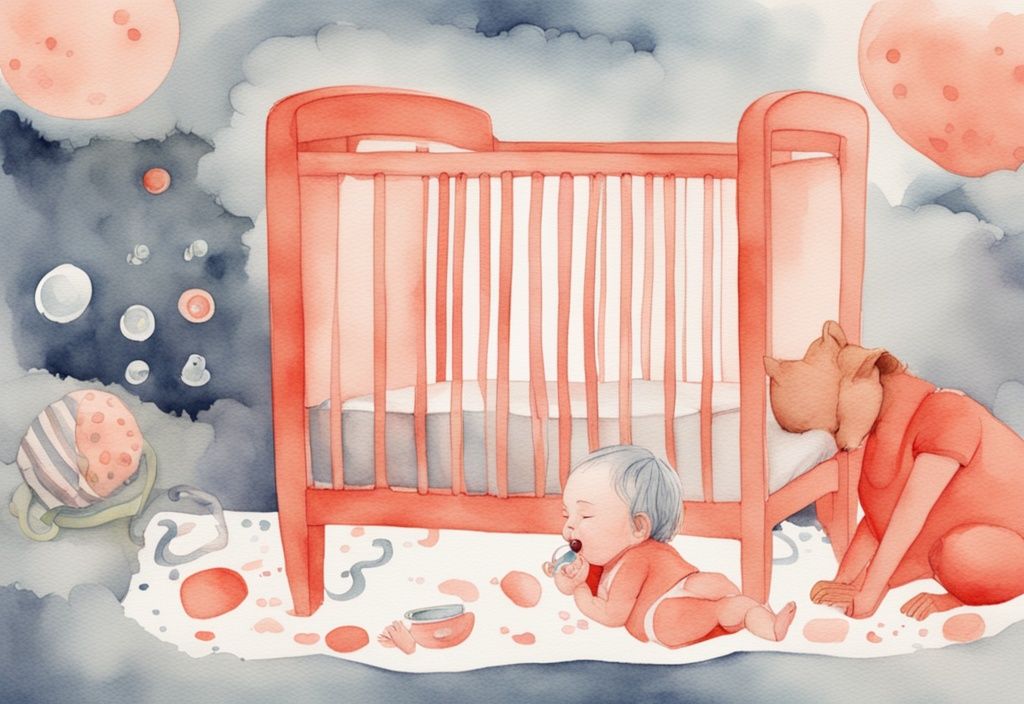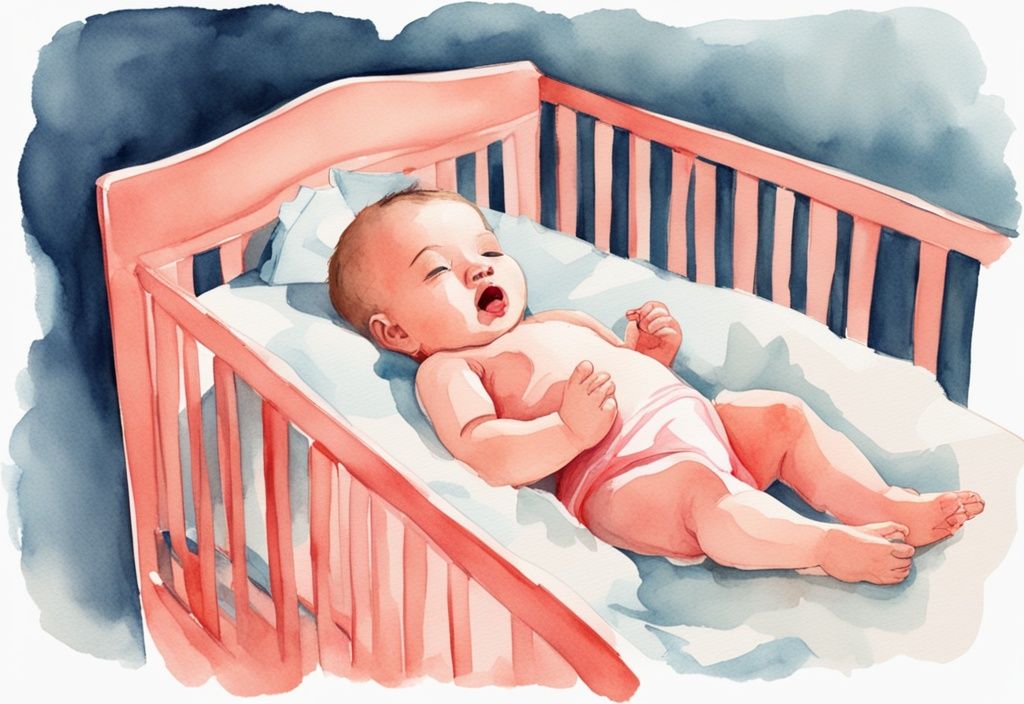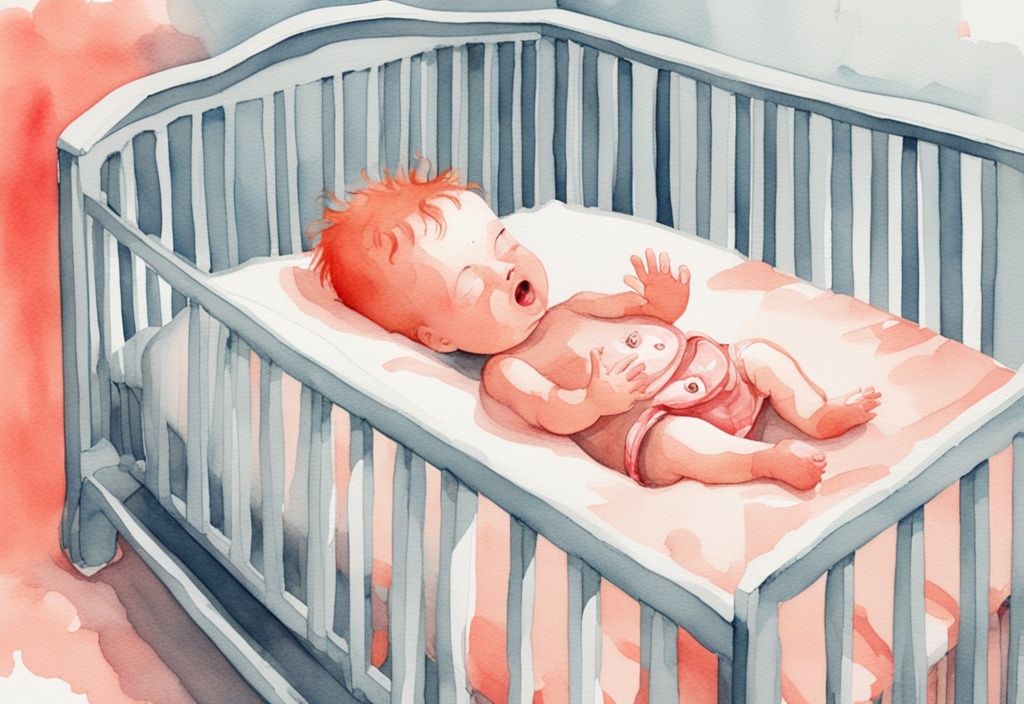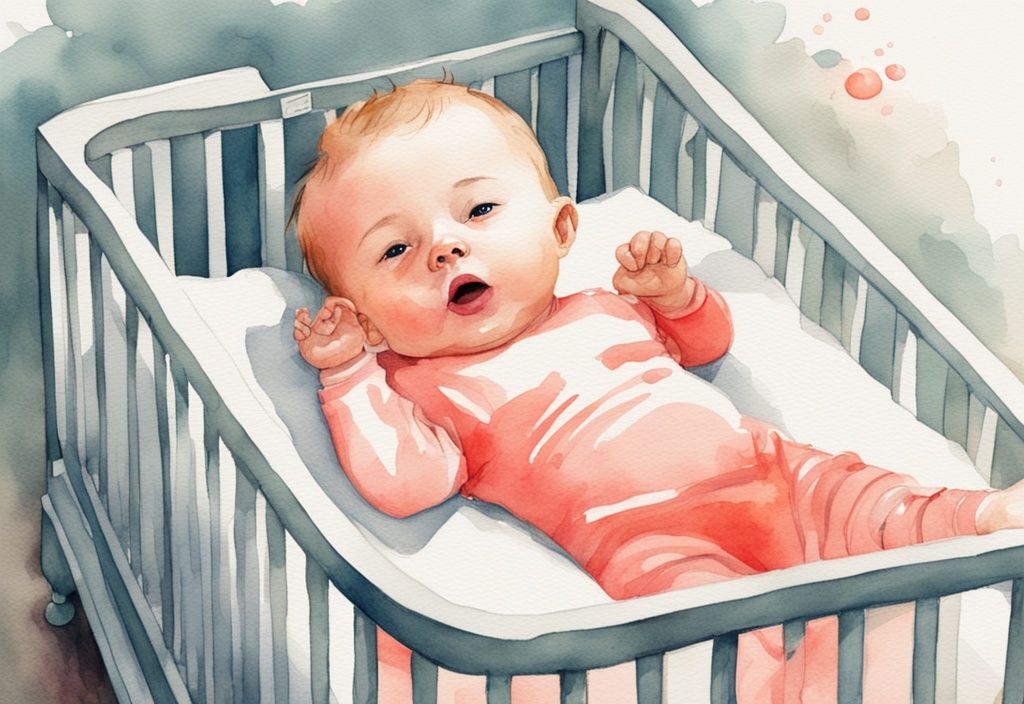Ever faced those restless nights when your baby wakes up the moment their pacifier falls out? It’s an all-too-common struggle we parents contend with, making bedtime feel more like a never-ending battle than a tranquil lullaby. But don’t worry, you’re not alone in this, and there’s hope at the end of this sleep-deprived tunnel.
In this article, we’ll explore why this happens and how we can nudge our little ones towards keeping their pacifiers, and more importantly, their sweet dreams intact. From choosing the right pacifier, encouraging self-soothing, to managing those little sleep disruptions, we’ll delve into practical solutions that offer you and your baby a renewed ticket to dreamland.
Remember, just as every baby is unique, so is their journey to peaceful sleep but with patience, understanding, and these proven tips, you’ll surely find the path that fits your little one best.
Understanding Why Babies Wake Up When Pacifier Falls Out
Babies waking up when their pacifiers fall out is a common issue many parents face. Let’s dive into the reasons behind this and explore effective solutions.
Natural Sucking Reflex and Sleep
As a mother of two, I’ve seen firsthand how the natural sucking reflex is ingrained in babies from birth. This reflex not only helps with feeding but also serves as a comforting mechanism, as explained in more detail about the [sucking reflex](https://www.healthline.com/health/parenting/sucking-reflex). Pacifiers become little sleep aids, soothing babies when they’re not feeling hungry. When this need to suck is met, it often results in longer and more restful sleep stretches. So, when a pacifier falls out, this disruption can understandably wake a baby, leading to a shorter, more restless night for everyone.
The Role of Comfort and Security
Pacifiers can serve as a baby’s security blanket. Much like a beloved teddy bear, a pacifier offers immense comfort and a sense of security. If it suddenly falls out, the loss can be quite distressing, jolting the baby awake. This can result in crying and general unrest. Recognizing this can help us as parents figure out how to tackle these sleep interruptions more effectively. Trust me, it’s all about understanding what makes our little ones tick.
How Age Affects Baby’s Sleep and Pacifier Use
The age of your baby plays a significant role in how they react to a fallen pacifier. From my experience and early childhood education background, I’ve noticed that infants aged 3 to 7 months are more likely to wake up when their pacifier falls out. For babies younger than 3 months, gently weaning them off the pacifier before they fully drift off can aid in teaching them to self-soothe.
This means they’re less reliant on the pacifier to stay asleep.
On the other hand, older babies, usually around 5 months and older, can learn to replace their pacifiers on their own. This newfound skill can be a game-changer, leading to undisturbed nights. Imagine the luxury of waking up to a baby who can self-sufficiently pop the pacifier back in! It takes a bit of patience and practice, but it’s definitely achievable.
Medical Conditions: From Ear Infections to Teething
Babies can also wake up frequently because of medical conditions such as ear infections or teething. These ailments can make them more uncomfortable and in need of their pacifier’s soothing effects. Teething, especially, can cause significant discomfort, with the pacifier acting like a tiny referee, keeping the peace.
If you find that the waking becomes a regular issue, it might be a good idea to consult with your pediatrician. Diagnosing and treating any underlying conditions can dramatically improve sleep patterns for both your baby and you. It’s all about ensuring everyone gets their much-needed rest.
Preparing the Perfect Pacifier: A Survival Guide
Unlocking the Mystery of Size and Shape
When choosing a pacifier, ensuring it is the right size and shape for your baby is paramount. A well-fitting pacifier can greatly minimize the risk of it falling out, which is particularly beneficial in avoiding those middle-of-the-night awakenings when your baby wakes up because the pacifier falls out. Pacifiers come in various sizes according to age groups, allowing you to select the most appropriate one for your baby’s needs.
The shape of the pacifier also plays a critical role in comfort and security. Orthodontic pacifiers are designed to support the natural development of a baby’s teeth and gums, while round-shaped pacifiers mimic the feel of a mother’s nipple. Choose a shape that your baby finds most comfortable to ensure they can hold onto it securely during sleep.
Experimenting with Different Pacifier Forms
Not all pacifiers are created equal, and experimenting with different forms can help find the one your baby holds onto most securely. Some pacifiers have textured surfaces or varied shapes that may better conform to your baby’s sucking reflex. This trial and error process is essential to finding a pacifier that fits well with your little one’s preferences and minimizes chances of loss during sleep.
Gently pulling on the pacifier when placed in your baby’s mouth can also encourage a more intentional sucking reflex. This gentle tugging can help strengthen the baby’s grip on the pacifier, reducing instances where your baby wakes up because the pacifier falls out. Over time, this practice can lead to more secure and comfortable sleep for both baby and parents.
Safe Practices for Excellent Pacifier Use
Following safe sleep guidelines is crucial when using pacifiers to ensure your baby’s safety and comfort. Avoid attaching clips or stuffed animals to the pacifier, as these can pose suffocation or strangulation hazards in the crib. Instead, make sure the sleep environment is free from any loose items that could disturb your baby.

Additionally, store extra pacifiers in a safe and clean place for easy access at night. This preparation can be a lifesaver when the pacifier falls out and you need a quick replacement. Having multiple pacifiers readily available can significantly reduce the stress and disruption caused when your baby wakes up without their pacifier.
Keys to Encouraging Better Sucking Habits
Encouraging better sucking habits can help your baby sleep more soundly and avoid waking up when their pacifier falls out. Here’s how you can do it effectively.
Mastering the Sucking Reflex
Developing a strong sucking reflex is essential for babies to keep their pacifiers securely in their mouths. One simple technique to strengthen this reflex is gently tugging on the pacifier while the baby is sucking on it. This encourages a more deliberate and engaged sucking motion, ensuring a firm grip on the pacifier.
It’s also important to let your baby naturally adjust to the pacifier without any force. Forcing it back into their mouth can disrupt their natural sucking habit and might lead to resistance or discomfort. Allowing your baby to manage the pacifier independently fosters better self-regulation and soothing skills.
The Power of Consistency and Patience
Consistency and patience are key, especially when your baby wakes up when the pacifier falls out. Implement regular sucking practice routines and stay patient as your baby adapts to new habits. It can take several weeks for them to fully embrace and master the technique, so gentle, persistent guidance is essential.
If your baby wakes up and cries for the pacifier, calmly replace it and avoid showing frustration. Responding calmly every time helps create a secure environment where your baby feels safe to practice self-soothing. Over time, with steady routines and positive reinforcement, your baby will gradually learn to manage their sucking reflex better, reducing the frequency of nighttime awakenings due to a fallen pacifier.
Nurturing Your Little One’s Self-Soothing Skills
The Journey to Self-Soothing
When your baby wakes up when pacifier falls out, it’s a signal to start nurturing their self-soothing skills. Begin by gently removing the pacifier just before your baby drifts off to sleep. This small step helps them rely less on external aids and more on their natural calming abilities. Consistency in sleep routines is also key. For more insights, you may want to explore our article on why is my baby suddenly taking short naps. Establish a bedtime routine that includes soothing activities like reading or a warm bath. Over time, these steady practices will help your baby develop strong self-soothing skills, making nighttime awakenings less frequent and easier to handle.
The “Binky Game”: A Fun Approach for Older Babies
If your baby wakes up when pacifier falls out, consider introducing the “binky game” for babies aged five months or older. This playful approach involves teaching them to find and replace the pacifier themselves.
During the day, place several pacifiers within your baby’s reach and encourage them to locate and handle them. It makes for a fun learning experience while also boosting their motor skills and independence. By practicing these skills during the day, they become more adept at managing the pacifier on their own at night, reducing sleep interruptions.
Incorporating Alternative Comfort Items
When your baby wakes up when pacifier falls out, trying alternative comfort items can be effective. Introduce soft toys or small blankets as substitutes. These can provide similar security and comfort.
Encouraging thumb-sucking or using a lovey can also be beneficial, as these alternatives are more likely to stay with your baby throughout the night, decreasing the chances of waking up. Observe which items your baby responds to best and integrate them into the bedtime routine.
Diversifying comfort sources gradually reduces dependence on the pacifier, leading to more restful nights for both baby and parents.

Tackling Sleep Disruptions Head-On
Exploring the Causes of Sleep Disruptions
Sleep disruptions in babies can arise from various sources. A frequent culprit is the fallen pacifier. When your baby wakes up and can’t find the pacifier, it often leads to crying and fragmented sleep. It’s like a tiny midnight mystery that keeps everyone up!
Other common factors might include discomfort from teething, ear infections, or even just external noises. By creating a cozy, disturbance-free sleep environment and checking for potential medical issues, you can alleviate many of these nighttime wake-ups.
Understanding the Impact on Baby and Parent’s Sleep
When a baby consistently wakes up because of a lost pacifier, it disrupts the entire household’s rest. The on-and-off sleep cycle can leave parents feeling exhausted and frazzled, leading to a cranky atmosphere the next day.
Addressing the root causes early is key. Not only will tackling these disruptions improve your baby’s sleep, but you’ll also notice a significant positive change in your own energy and mood. It’s a win-win for both baby and parents!
Practical Solutions to Keep Baby Soothed
Incorporating the pacifier into nap and bedtime routines can be a lifesaver at first. But eventually, you’ll want to gently encourage your baby to sleep without it. This helps prevent dependency and promotes self-soothing.
Respond to those middle-of-the-night cries with empathy. Try other soothing methods like gentle rocking, soft white noise, or a warm pat. These approaches not only calm your baby down but also nurture their ability to self-soothe over time.
Storing Extra Pacifiers for Quick Retrieval
Keeping extra pacifiers within easy reach can be a game-changer. Stash a few in a secure and accessible spot so you can quickly replace a lost one. Another handy trick: place multiple pacifiers in the crib. This helps your baby find one on their own if it falls out, reducing the need for your midnight intervention.
Guidance on Pacifier Use after Baby Falls Asleep
If the pacifier falls out after your baby has drifted off, it’s generally best to let it be. This encourages self-soothing, which is crucial for longer, uninterrupted sleep sessions. Sneaking in to remove the pacifier can backfire and cause more wakes, undoing all your hard work.
Reducing Dependence: The Path to Pacifier Freedom
Reducing the reliance on a pacifier helps your baby sleep more soundly and independently. This section will explore gentle weaning techniques, creating a consistent sleep environment, and avoiding common pitfalls.
The Art of Weaning Off the Pacifier
Reducing the reliance on a pacifier can be a gentle process. Start by gradually decreasing the time the pacifier is used at night. For example, use it only during initial bedtime but remove it as the baby drifts off to sleep.
This slow reduction helps the baby adjust without feeling a sudden loss of comfort, which can cause anxiety and lead to sleep disruptions. Employ positive reinforcement to make alternative comfort strategies feel rewarding.
Celebrate small milestones like the baby sleeping longer without the pacifier, and introduce comforting bedtime rituals like a warm bath or soothing lullabies to replace the pacifier’s role in sleep preparation.
Creating a Consistent Sleep Environment
A predictable and calm bedtime routine is paramount for weaning off the pacifier. A regular sleep schedule helps regulate the baby’s internal clock, making the transition smoother.
 Create a serene sleep environment conducive to uninterrupted rest; for instance, ensure the room is dark, quiet, and at a comfortable temperature. Soft background noises, like white noise machines, can mask external sounds that might wake up the baby.
Create a serene sleep environment conducive to uninterrupted rest; for instance, ensure the room is dark, quiet, and at a comfortable temperature. Soft background noises, like white noise machines, can mask external sounds that might wake up the baby.
Consistently applying these methods reassures the baby and helps them connect their sleep cycles without relying on the pacifier, gradually fostering better self-soothing habits.
Pitfalls and Precautions when Breaking the Pacifier Habit
An abrupt removal of the pacifier can significantly increase anxiety and result in more frequent awakenings. To avoid this pitfall, implement a gradual weaning process. Monitor the baby for signs of stress and adjust the approach as needed.
Be cautious of long-term implications such as dental issues, which can arise from prolonged pacifier use. Consulting with a pediatrician is advised to ensure a healthy transition. They can provide tailored advice based on your baby’s specific needs and developmental stage.
Taking these precautions aids in a smoother, stress-free journey towards pacifier independence.
Conclusion: Surviving and Thriving in the Pacifier Phase
Navigating the pacifier phase can indeed be a challenging journey, especially when dealing with situations like a baby wakes up when pacifier falls out. However, armed with patience and consistency, parents can transform this phase into a smoother, more manageable experience for both themselves and their little ones.
It’s essential to recognize that every baby is unique. Tailoring your approach to suit your baby’s specific needs and preferences is key to success. Observe your baby’s behaviors and responses, and be flexible in adapting your methods. This individualized attention not only helps in addressing immediate concerns but also builds a stronger bond between you and your baby.
Gradual transitions play a crucial role in ensuring that your baby can adapt without feeling overwhelmed. Whether it’s weaning them off the pacifier or introducing other forms of comfort, taking small, consistent steps can make a significant difference. This gradual approach allows babies to slowly adjust to new routines and habits, minimizing disruptions and fostering a sense of security.
Creating and maintaining a supportive environment is imperative. Ensure that your baby’s sleep space is comfortable, safe, and conducive to self-soothing. Establish consistent nap and bedtime routines to provide a sense of structure and predictability. This stability not only helps in reducing the baby’s dependency on the pacifier but also promotes overall well-being and restful sleep for both the baby and the parents.
Lastly, remember that patience is your greatest ally. The journey through the pacifier phase is replete with learning curves and adjustments. Celebrate small victories, remain empathetic to your baby’s needs, and seek support when necessary. With a balanced approach, you can successfully navigate this phase, ensuring that both you and your baby thrive.
FAQ on Baby Wakes Up When Pacifier Falls Out
Most parents have been there: your sweet baby wakes up when the pacifier falls out. This section provides answers to some of the most common concerns around this issue.
When Do Babies Usually Outgrow the Pacifier?
Most little ones let go of the pacifier habit between 18 to 24 months. Still, the exact timing can differ as each child has unique comfort needs and developmental milestones. Watch for signs your baby is naturally losing interest—for example, if they start using other self-soothing methods—and go from there.
How Can I Help My Baby Locate the Pacifier at Night?
Try putting multiple pacifiers in the crib. This way, if one falls out, another is nearby for your baby to find. Those cute animal pacifier holders can also be a game-changer, making it easier for your baby to locate a pacifier in the dark. Less nighttime disruption means everyone gets more sleep.
Are there Risks of Prolonged Pacifier Use?
Yes, using a pacifier for too long can lead to dental issues, speech delays, and increased dependency. It’s essential to balance pacifier use with other comfort strategies and consult your pediatrician about when it’s best to start weaning off the pacifier. Think of it as another step in your baby’s growth journey.
Should I Reinsert the Pacifier if My Baby Wakes Up?
Try to let your baby self-soothe rather than rushing to reinsert the pacifier each time. Consistently reinserting can make them more dependent on it, which could cause more frequent sleep interruptions. Encouraging self-soothing practices helps build better sleep habits, leading to a more peaceful night for everyone.
Creating a Safe Sleep Environment for Your Baby
Follow safe sleep guidelines to give your baby the best rest environment. Avoid using pacifier clips or attaching stuffed animals to the pacifier. Ensure the sleep space is free of hazards and as comfortable as possible. A safe and cozy crib contributes to more restful and uninterrupted sleep for your precious one. For parents seeking guidance on specific challenges, understanding how to soothe a baby after tongue tie surgery can be invaluable in ensuring comfort and tranquility.

